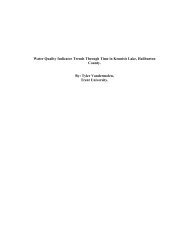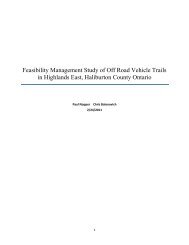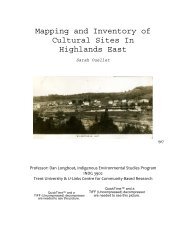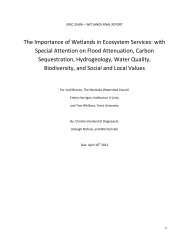Untitled - Haliburton County Community Cooperative Inc
Untitled - Haliburton County Community Cooperative Inc
Untitled - Haliburton County Community Cooperative Inc
- No tags were found...
Create successful ePaper yourself
Turn your PDF publications into a flip-book with our unique Google optimized e-Paper software.
equipment and this only begins to scratch the surface of the fishing industry. The following pages willattempt to place an approximate figure off the economic significance of recreational fishing in Muskoka.In order to do so the economic factors and values of recreational fishing, the benefits of healthywaterways, native aquatic biodiversity and healthy habitats for the key fish species in the area will all beexamined.1.1: Background Economics of Fishing in the RegionFishing can and is often seen as a very inexpensive activity that is simply used as a pastime and away of getting in touch with nature and the environment. Although this description can still apply tocertain cases, recreational fishing as evolved at an unimaginable rate over the past century. What beganas simply attaching a small hook to a thin line and tying it to a stick has evolved into a multi-milliondollar industry that is now heavily managed, monitored and studied.The evolution of fishing from its very primitive beginnings signifies that recreational fishing itselfhas become its own industry and provides large economic benefits to a large number of regions. Thereal cost of fishing now incorporates the costs associated with; fishing licenses, fishing gear and tackle,vehicles, boats, all other forms of boating equipment (life jacket, GPS, fish finders etc.), gas, food,lodgings, bait shops and fishing guides. These additional factors are simply a rough guide to the coststhat can be attributed to the recreational fishing industry.Muskoka is part of eco-region 5E which is a large zone which is primarily composed of fishingzone 15. Fishing zone 15 composes roughly 85% of eco-region 5E and as a result all figures and data thatwill be presented will be from zone 15 but one must remember that the actual amounts will be slightlylarger due to the additional 15% that is being left unaccounted for. All of the data being analyzed isfrom the Ministry of Natural Resources 2005 survey of recreational fishing. The data collected is part oftheir Survey of Recreational Fishing in Canada which is conducted every 5 years. In 2005, 23,993licensed anglers, which represented 1.8% of licensed anglers. Approximately 36% of those surveyed4







